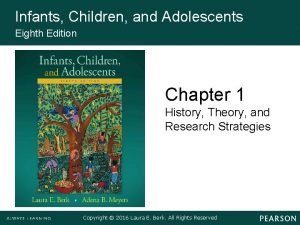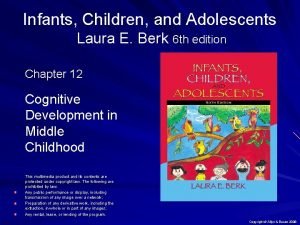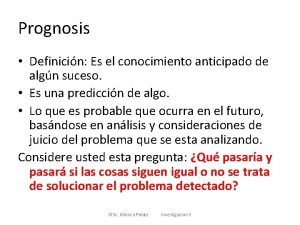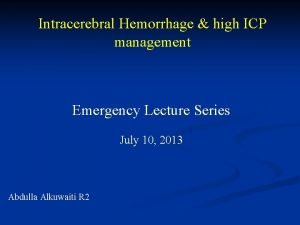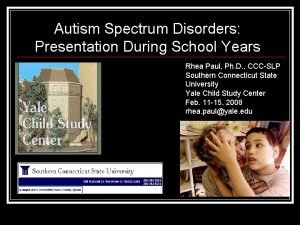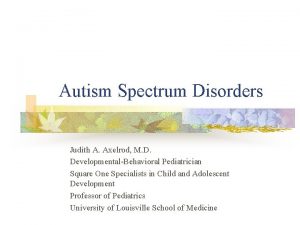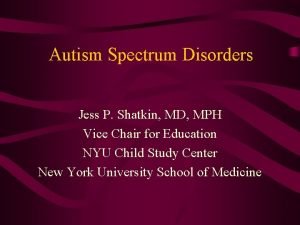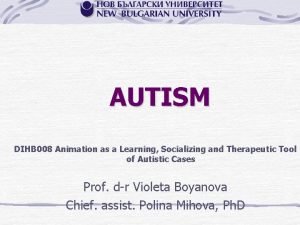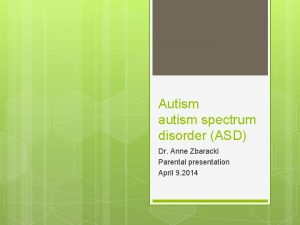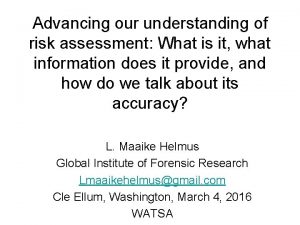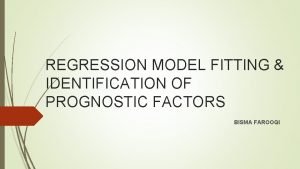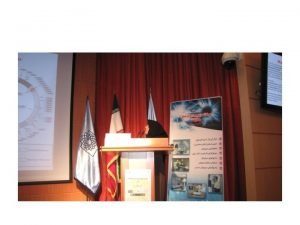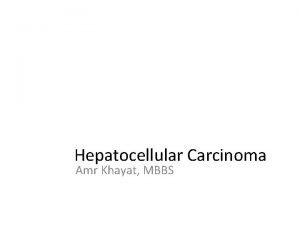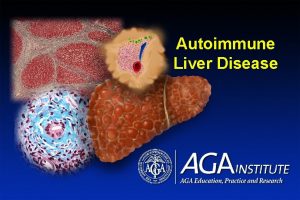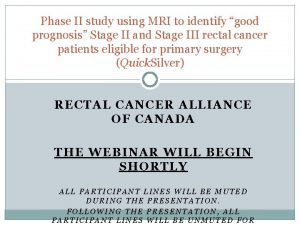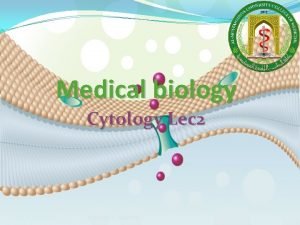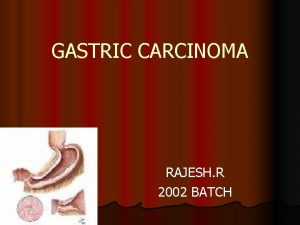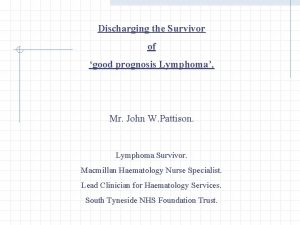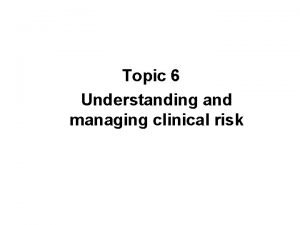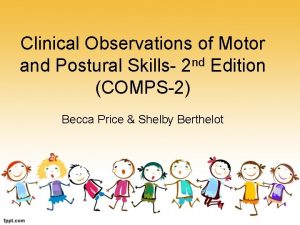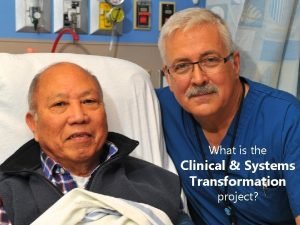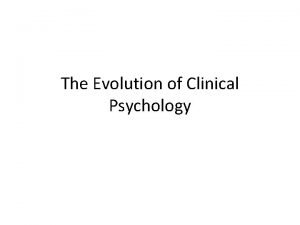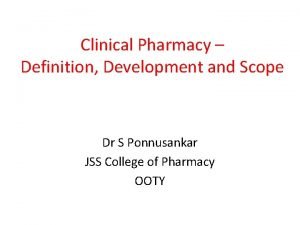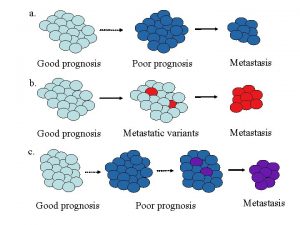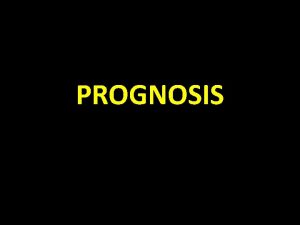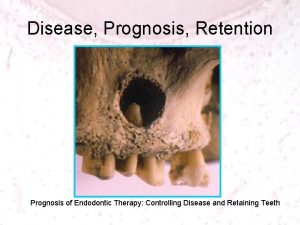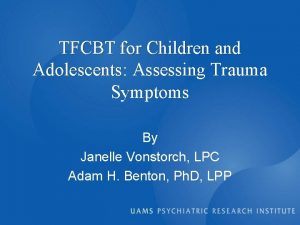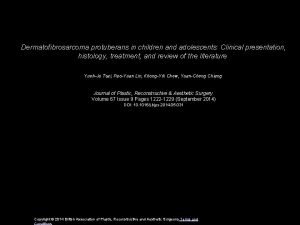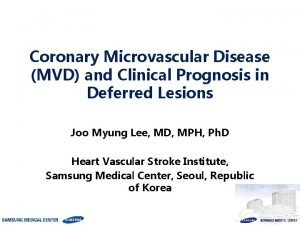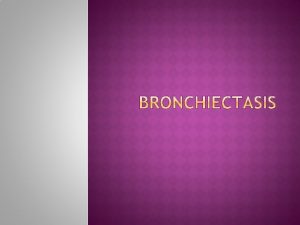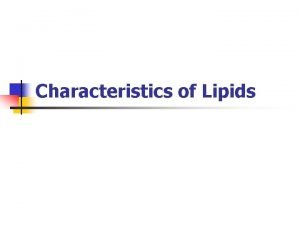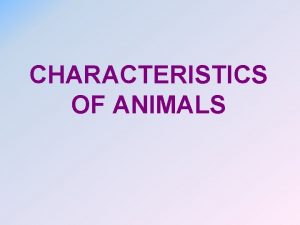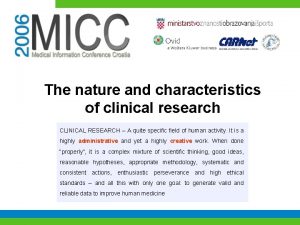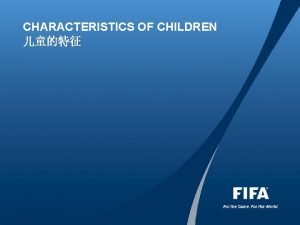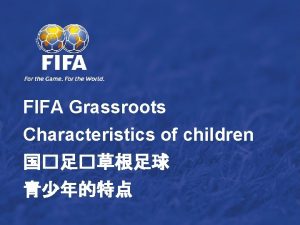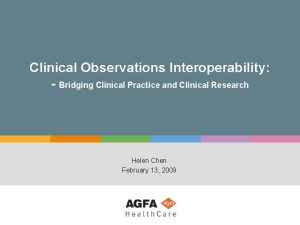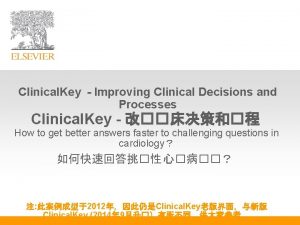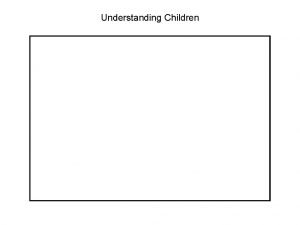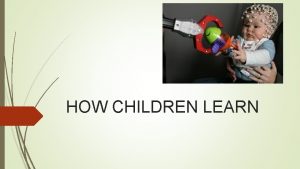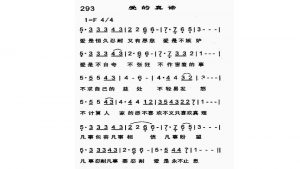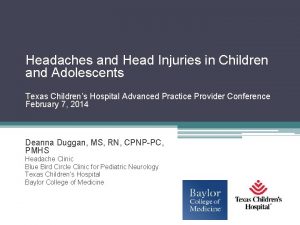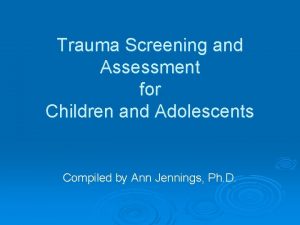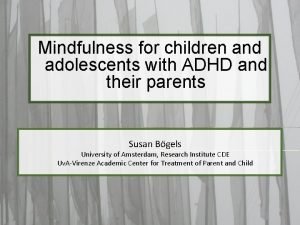Clinical Characteristics and Prognosis in Children and Adolescents


























- Slides: 26

Clinical Characteristics and Prognosis in Children and Adolescents With Autoimmune Hepatitis and Overlap Syndrome 兒童和青少年自身免疫性肝炎和重疊綜合徵的臨床特徵和預後 DRA. ADRIANA TEIXEIRA RODRIGUES


Clinical Characteristics and Prognosis in Children and Adolescents With Autoimmune Hepatitis and Overlap Syndrome 兒童和青少年自身免疫性肝炎和重疊綜合徵的臨床特徵和預後 AUTOIMMUNE HEPATITIS � 134 children and adolescents � diagnosis of autoimmune hepatitis (AIH), � January 1986 to March 2014. (對134例自身免疫性肝炎(AIH)診斷為兒童和青少年的隊列研究,從 1986年 1月至 2014年 3月出現。)

Clinical Characteristics and Prognosis in Children and Adolescents With Autoimmune Hepatitis and Overlap Syndrome 兒童和青少年自身免疫性肝炎和重疊綜合徵的臨床特徵和預後 Brief introduction Autoimmune hepatitis (AIH): �rare in childhood (incidence ~0. 4 / 100, 000) �chronic inflammation, �hypergammaglobulinemia, �presence of circulating autoantibodies, �presence of other autoimmune conditions in the patient or their close relatives; �good response to treatment.

AIH: clinical presentation �The clinical presentation is varied, being justified his research in all the patients with acute or chronic hepatitis without determinate cause. �Presentation: Acute hepatitis Chronic hepatitis Fulminant hepatic failure Silent or asymptomatic �It is more frequent in the female gender.

AIH: types �AIH type 1: anti-nuclear antibody (ANA) or smooth muscle antibody (SMA), or anti-actin antibody (AAA). �AIH type 2 (HAI-2): antibodies to liver-kidney microsome type 1 (anti-LKM 1) and/or anti-bodies to liver cytosol type 1 (anti-LC 1). ALVAREZ et al. , 1999; MIELI-VERGANI, 2009; FERRI et al. , 2012.

AIH: diagnosis Diagnosis: It is based on the following parameters � 1) Histology; � 2) Autoantibody titers; � 3) Ig. G or gammaglobulin level, and � 4) Absence of viral hepatitis Diagnostic criteria, 1993 (JOHNSON, Mc. FARLANE, 1993). Criteria reviewed, 1998 (ALVAREZ et al. , 1999) Simplified criteria (HENNES et al. , 2008)

AIH: diagnosis �There was no morphological pathognomonic finding. � It is suggestive "the presence of interface hepatitis, necroinflammatory lymphoplasmacytic infiltration, hepatic rosette formation and nodular regeneration in severe cases "(ALVAREZ et al. , 1999)

Criteria for diagnosis of autoimmune hepatitis �JOHNSON P. J. ; Mc. FARLANE, Ian G. Meeting Report: International Autoimmune Hepatitis Group. Hepatology, v. 18, n. 4, p. 998 -1005, out. , 1993. �ALVAREZ, Fernando et al. International Autoimmune Hepatitis Group Report: review of criteria for diagnosis of autoimmune hepatitis. Journal of Hepatology, v. 31, p 929 -938, 1999. �HENNES, Elke M et al. Simplified Criteria for the Diagnosis of Autoimmune Hepatitis. Hepatology, v. 48, n. 1, jul. , 2008.

AIH: Simplified Diagnostic Criteria for Autoimmune Hepatitis in Children 2008 diagnostic criteria for AIH: excellent sensitivity and specificity Except in those AIH patients with FHF. Recommended in this case the 1999 system. Cholangiographic studies should be performed in all children with AIH to exclude PSC. Serum globulin levels and Ig. G can be used interchangeably ELIZABETH MILETI, PHILIP ROSENTHAL, and MARION G. PETERS. Validation and Modification of Simplified Diagnostic Criteria for Autoimmune Hepatitis in Children. CLINICAL GASTROENTEROLOGY AND HEPATOLOGY 2012; 10: 417– 421

Clinical Characteristics and Prognosis in Children and Adolescents With Autoimmune Hepatitis and Overlap Syndrome Autoimmune sclerosing cholangitis (ASC): �Those patients who presented increased levels of gamma glutamyl transferase (GGT) and/or poor response to immunosuppressive treatment were referred for magnetic resonance imaging (MRI) of the biliary tract. �The diagnosis of ASC was established when the MRI showed the presence of abnormalities in the biliary tract, such as stenosis and/or dilatation of the intra- and/ or extrahepatic ducts.

AIH: treatment protocol �prednisone and azathioprine: 1 to 2 mg / kg / day (maximum 60 mg / day) and 1. 5 mg / kg / day (maximum 100 mg / day), respectively. �Prednisone was reduced by 10 mg every two weeks until a dose of 20 mg / day, when it was reduced from 5 mg every two months to 5 mg every other day, keeping the patient in clinical-laboratory remission. �Azathioprine was maintained at the initial dose, unless leukopenia or thrombocytopenia were present. �Ursodeoxycholic acid was associated with treatment in suspected cases of association with autoimmune cholangitis: 15 to 20 mg / kg / day.

Medication withdrawal � Patients with type 1 AIH (ANA and / or AML positive) � complete response to treatment, � clinical and laboratory remission time of at least 24 months, � no inflammatory activity in the histopathology hepatic. � The drug suspension schedule: prednisone 25% reduction in maintenance dose (5 mg / day) every 7 days; azathioprine - its suspension is initiated after the suspension of prednisone; in the beginning, it is halved and completed one month later. � Clinical and laboratory evaluation every two months after discontinuation of the medication. � Considered reactivation: clinical manifestations suggestive of the disease, elevation of aminotransferases, gammaglobulin fraction, and autoantibodies reappearance. � The change in any of these parameters is reason for reintroduction of the treatment.

Clinical Characteristics and Prognosis in Children and Adolescents With Autoimmune Hepatitis and Overlap Syndrome � Cohort study of 134 children and adolescents with a known diagnosis of autoimmune hepatitis (AIH), attended from January 1986 to March 2014. (對134例自身免疫性肝炎(AIH)診斷為兒童和青少年的隊列研究,從 1986年 1月至 2014年 3月出現。) � First studies: 1996 (28 children) and all patients have their data updated, even after they turn 18, to this time. 第一次研究: 1996年(28名兒童),所有患者的數據在 18歲之後即更新

First studies: 1996 �First studies: 1996 (28 children)

Other studies � Proper treatment improves the prognosis and reduces the formation of fibrosis and progression to cirrhosis in patients with AIH.

Clinical Characteristics and Prognosis in Children and Adolescents With Autoimmune Hepatitis and Overlap Syndrome �HEPATOLOGY Vol. 33, No. 3, 2001 �This was special because those children like ours was first diagnosed with AIH.

Autoimmune sclerosing cholangitis (ASC). � During follow-up, some of those 134 children with IAH developed autoimmune sclerosing cholangitis (ASC). 在隨訪期間,其中一些發展為自身免疫性硬化性膽管炎 �Suspected diagnosis: increased levels of GGT and/or poor response to immunosuppressive treatment �The diagnosis of ASC was established when the MRI showed the presence of abnormalities in the biliary tract, such as stenosis and/or dilatation of the intra- and/ or extrahepatic ducts.

Results The baseline clinical characteristics

Comparison between groups concerning the laboratory parameters at baseline

RESULTS: GGT Those patients whose GGT level increased during follow -up period, however, had the diagnosis of overlap syndrome more often than those whose GGT level remained normal (P = 0. 018). It was also observed that none of the patients whose GGT values were normal or rose up to 1. 5 times the upper normal limit at baseline developed ASC (P<0. 017).

RESULTS: follow-up

Survival probability

Discussion - conclusion �Female gender: AIH >AIH/SC �GGT normal: AIH INCREASED GGT => AIH~AIH/SC �Time at remission: AIH >AIH/SC �Relapse more often AIH/SC �Transplantation AIH ~AIH/SC (16 patients) �Mortality AIH ~AIH/SC �Bigger impact in mortality: cirrhosis (68%); Gregorio et al found a 15% prevalence of cirrhosis in patients with overlap syndrome, compared with 23% in patients with AIH (Gregorio GV, Portmann B, Karani J, et al. Autoimmune hepatitis/sclerosing cholangitis overlap syndrome in childhood: a 16 -year prospective study. Hepatology 2001; 33: 544– 53). .

Thank you! 謝謝

Belo Horizonte - Brazil
 Infants, children and adolescents 8th edition
Infants, children and adolescents 8th edition Lara berk
Lara berk Orleans hanna algebra prognosis test
Orleans hanna algebra prognosis test Ejemplos de prognosis
Ejemplos de prognosis Ich score prognosis
Ich score prognosis Hellp syndrome symptoms
Hellp syndrome symptoms Autism prognosis
Autism prognosis Splinter skills
Splinter skills Autism prognosis
Autism prognosis Kanner syndrome
Kanner syndrome Global developmental delay symptoms
Global developmental delay symptoms Static-99
Static-99 What is prognosis
What is prognosis Prognosis
Prognosis Child-pugh score prognosis
Child-pugh score prognosis Cholangitis prognosis
Cholangitis prognosis Good prognosis
Good prognosis Prognosis of cystic fibrosis
Prognosis of cystic fibrosis Borrmann classification
Borrmann classification Good prognosis
Good prognosis The adolescent in society guided reading section 2
The adolescent in society guided reading section 2 Understanding and managing clinical risk
Understanding and managing clinical risk Clinical observations of motor and postural skills
Clinical observations of motor and postural skills Administrative healthcare information systems
Administrative healthcare information systems Clinical systems transformation
Clinical systems transformation Nature and scope of clinical psychology
Nature and scope of clinical psychology Development of clinical pharmacy
Development of clinical pharmacy
